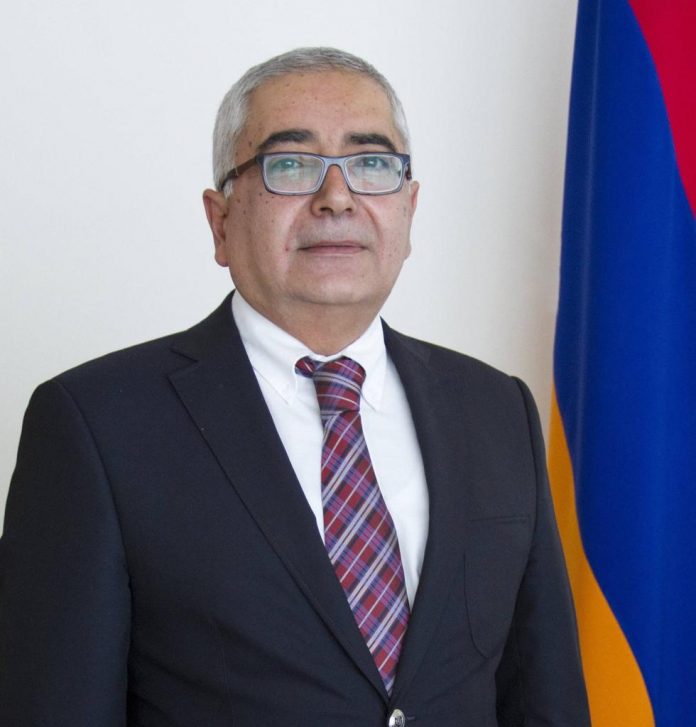H.E Sarmen Baghdassarian
Ambassador of Armenia to Kuwait
Persecutions of Armenians started in Baku in the spring of 1988, immediately after the events in Sumgait, and continued until 1989. Armenians were illegally dismissed from work, and forcefully evicted from their apartments and houses. They were beaten, subjected to public mockery and murder. By January 1990, only 35-40 thousand out of the 300 thousand Armenian inhabitants remained in Baku. Most of them were old, lonely, sick or socially vulnerable people who did not want or were not able to leave their homes, as well as their relatives, who did not want to leave them alone.
On January 11, during a rally organized by the Popular Front of Azerbaijan (PFA) in Baku, calls were made for the eviction of the Armenians from Baku and for mass armed march on Karabakh.
By January 13, Armenian massacres in Baku became systematized and comprehensive. In the evening of the same day, a crowd of 50 thousand people, chanting slogans “Glory to the heroes of Sumgait” and “Long live Baku without Armenians” gathered to rally. Then, divided into groups led by activists, pogrom-makers embarked upon methodically “cleansing” the city of Armenians house by house. Evidence abounds on atrocities and murders committed with extreme cruelty.
Those who managed to escape death were subjected to forced deportation. Thousands of Armenians were brought to the port of Krasnovodsk city in Turkmen SSR by a ferry across the Caspian Sea, and were later sent to Armenia and Russia by airplanes.
According to the testimony of the Armenian refugees from Baku, the pogrom-makers had a standard plan of action. In the beginning, a group of 10-20 people would break into an apartment and forced the owners to leave the house immediately and go to the port.
They would allow people to take personal belongings but would confiscate money, jewellery and bankbooks for saving accounts. Azerbaijani activists operated posts at the port, where they searched the refugees, often beat them again and only then deported.
The Armenian pogroms of Baku surpassed the massacres of Armenians of Sumgait in the number of victims, duration, and the scale. The exact number of the murdered is still unknown. According to different sources, 150 to 300 people were killed. The massacres continued for an entire week in the conditions of complete inactivity of the Azerbaijani authorities.
Units of the Soviet Army were deployed to the capital of Azerbaijan only in the night of 20 January 1990, and encountered fierce resistance by armed groups. The number of casualties among the servicemen also evidences to the serious armed resistance shown to the troops deployed in the city.
It is obvious that the preparations for massacres of Armenians in Baku had started well before the 13th of January 1990. That is proved by the availability to pogrom-makers of detailed maps in which the city was divided into districts and regions and the locations of remaining compact Armenian settlements were marked.
On the occasion of the massacres of Armenians in Baku and attacks on Getashen and other Armenian villages of Shahumyan region, on January 18 the European Parliament adopted a resolution titled “On the Situation in Armenia”, which called for the authorities of the USSR to “guarantee real protection for the Armenian people living in Azerbaijan by sending forces to intervene”.
On 27 July 1990, an open letter addressed to the international community was published in the New York Times. The letter was signed by 133 prominent scholars and human rights advocates from Europe, Canada and the USA, who voiced their complaint against the killings and pogroms of Armenians in Baku. It stated, particularly, that “The crimes committed against Armenian minority have become a consistent practice in Azerbaijan, if not an official policy”.
The anti-Armenian policy of the authorities of Azerbaijan targeted not only the Armenian population living and prospering in Baku for centuries, but also the Armenian historical-cultural heritage.
So far, the masterminds and perpetrators of the anti-Armenian massacres in Baku have not been held accountable, and they continue to be glorified as heroes.
Today by paying tribute to the innocent victims of the anti-Armenian massacres in Baku, we once again emphasize the joint commitment of the Republic of Armenia, and the Armenians all over the world to ensure the right of all Armenians to free, secure and dignified life in their homeland.
Source: Embassy of Armenia, Kuwait

















